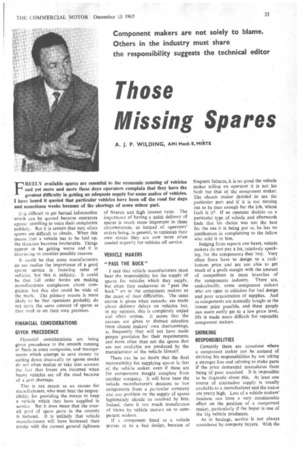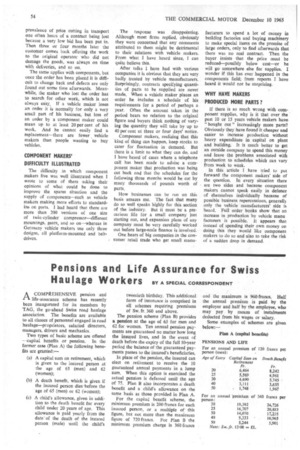Those Missing Spares
Page 55

Page 56

If you've noticed an error in this article please click here to report it so we can fix it.
A. J. P. WILDING, AM I Mech E, MIRTE REELY available spares are essential to the economic running of vehicles and yet more and more these days operators complain that they have the greatest difficulty in getting an adequate supply for some makes of vehicles.
I have heard it quoted that particular vehicles have been off the road for days and sometimes weeks because of the shortage of some minor part.
It is difficult to get factual information which can be quoted because operators appear unwilling to voice their complaints publicly. But it is certain that very often spares are difficult to obtain. When this means that a vehicle has to be laid up, the situation becomes intolerable. Things appear to be getting worse and it is interesting to consider possible reasons.
It could be that some manufacturers do not realize the importance of a good spares service in fostering sales of vehicles, but this is unlikely. It could be that full order books are making manufacturers complacent about complaints, but this also could be wide of the mark. The primary reason is more likely tobe that operators probably do not carry the same amount of spares as they used to on their own premises.
FINANCIAL CONSIDERATIONS GIVEN PRECEDENCE Financial considerations are being given precedence to the smooth running of fleets in some companies, and managements which attempt to save money by cutting down drastically on spares stocks do not often realize or take into account the fact that losses are incurred when heavy vehicles are off the road because of a part shortage.
This is not meant as an excuse for manufacturers, who must bear the responsibility for providing the means to keep a vehicle which they have supplied in service. But it does mean that the overall pool of spare parts in the country is reduced. It is unlikely that vehicle manufacturers will have increased their stocks with the current general tightness
of finance and high interest rates. The importance of having a quick delivery of spares is much more important in these circumstances, as instead of operators' orders being, in general, to replenish their own stocks they are now more often needed urgently for vehicles off service.
VEHICLE MAKERS "PASS THE BUCK" I said that vehicle manufacturers must bear the responsibility for the supply of spares for vehicles which they supply, but often they endeavour to "pass the buck" on to the component makers as the cause of their difficulties. The same excuse is given when remarks are made about delivery delays on vehicles but, in my opinion, this is completely unjust and often untrue. It seems that the excuses are given to distract attention from chassis makers' own shortcomings, as frequently they will not have made proper provision for their requirements and more often than not the spares that are not available are produced by the manufacturer of the vehicle himself.
There can be no doubt that the final responsibility for supplying spares is that of the vehicle maker, even if these are for components bought complete from another company. It will have been the vehicle manufacturer's decision to buy components from a particular company and any problem on the supply of spares legitimately should be resolved by him. Indeed, there is too much transference of blame by vehicle makers on to component makers. '
If a component fitted to a vehicle proves to be a bad design, because of frequent failures, it is no good the vehicle maker telling an operator it is not his fault but that of the component maker. The chassis maker decided to use the particular part and if it is not turning out to be man enough for the job, whose fault is it?. If an operator decides on a particular type of vehicle and afterwards finds that his choice was not the best for the use it is being put to, he has no justification in complaining to the fellow who sold it to him.
Judging from reports one hears, vehicle makers do not pay a lot, relatively speaking, for the components they buy. Very often firms have to design to a rockbottom price and are not able to get much of a profit margin with the amount of competition in most branches of the components industry. There are, undoubtedly, some component makers who are open to criticism for bad design and poor organization of supplies. And as components are normally bought at the lowest price possible, and these people can more easily get to a low price level, life is made more difficult for reputable component makers.
SHIRKING RESPONSIBILITIES Certainly there are occasions where a component maker can be accused of shirking his responsibilities by not taking a stronger line and refusing to make parts if the price demanded necessitates them being of poor standard. It is impossible to be dogmatic about this. At least one source of alternative supply is usually available to a manufacturer and the stakes are pretty high. Loss of a vehicle makers' business can have a very considerable effect on the position of a component maker, particularly if the buyer is one of the big vehicle producers.
As in haulage, service is not always considered by company buyers. With the prevalence of price cutting in transport one often hears of a contract being lost because a very low bid has been put in. Then three or four months later the customer comes back offering the work to the original operator who did not damage the goods, was always on time with deliveries, and so on.
The same applies with components, but once the order has been placed it is difficult to change back and defects are only found out some time afterwards. Meanwhile, the maker who lost the order has to search, for other work, which is not always easy. If a vehicle maker loses an order it is normally for only a very small part of his business, but loss of an order by a component maker could mean up to at least 20 per cent of his work. And he cannot easily find a replacement—there are fewer vehicle makers than people wanting to buy vehicles.
COMPONENT MAKERS' DIFFICULTY ILLUSTRATED The difficulty in which component makers live was well illustrated when I wrote to some of them asking their opinions of what could be done to improve the spares situation and the supply of components—such as vehicle makers making more efforts to standardize on parts. I had heard that there are more than 200 versions of one size of twin-cylinder compressor—different mountings, gears, and so on—whereas in Germany vehicle makers use only three designs, all platform-mounted and beltdriven. The response was disappointing. Although most firms replied, obviously they were concerned that any comments attributed to them might be detrimental to their relations with vehicle makers. From what I have heard since, I can quite believe this.
After talks I have had with various companies it is obvious that they are very badly treated by vehicle manufacturers. Surprisingly, contracts specifying quantities of parts to be supplied are never made. When a vehicle maker places an order he includes a schedule of his requirements for a period of perhaps a year. Often the amount taken in the period bears no relation to the original figure and buyers think nothing of varying the quantity they will take by up to 40 per cent at three or four days' notice.
Component makers, realizing that this kind of thing can happen, keep stocks to cater for fluctuation in demand. But there is a limit to what they can do, and I have heard of cases where a telephone call has been made to advise a component maker that production was being cut back and that the schedules for the following three months would be cut by many thousands of pounds worth of parts.
How businesses can be run on this basis amazes me. The fact that many do so well speaks highly for this section of the industry. But it must be a precarious life for a small company just starting out, and expansion plans of any company must be very carefully worked out before large-scale finance is involved.
One hears of big companies in the consumer retail trade who get small manu
facturers to spend a lot of money in building factories and buying machinery to make special items on the promise of large orders, only to find afterwards that there was no real contract. Then the buyer insists that the price must be reduced—possibly below cost—or he will go somewhere else for supplies. I wonder if this has ever happened in the components field; from reports I have heard it would not be surprising.
WHY HAVE MAKERS PRODUCED MORE PARTS?
If there is so much wrong with component supplies, why is it that over the past 10 or 15 years vehicle makers have "bought out" increasingly more parts? Obviously they have found it cheaper and easier to increase production without heavy expenditure in capital on plant and building. It is much better to get an outside company to spend this money and leave the problems associated with production to schedules which can vary from week to week.
In this article I have tried to put forward the component makers' side of the question. In every situation there are two sides and because component makers cannot speak easily in defence of themselves individually because of possible business repercussions, generall) only the vehicle manufacturers' side is heard. Full order books show that an increase in production by vehicle manu facturers is possible. It appears that instead of spending their own money on doing this they would like component makers to do so and also to take the risk of a sudden drop in demand.




























































































































